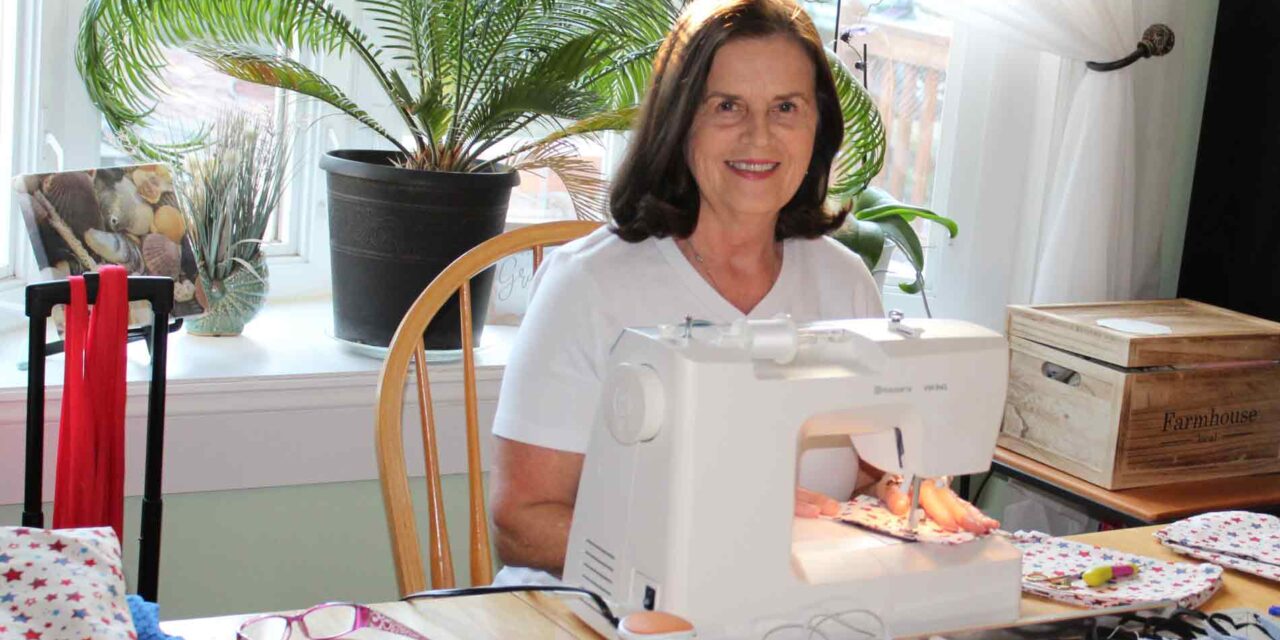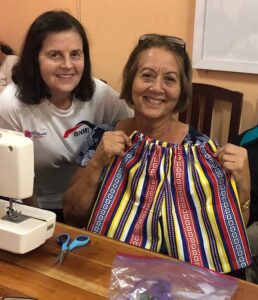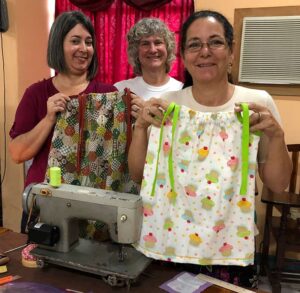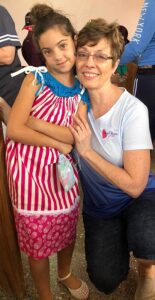
Kathy Diehl traveled to Cuba and was able to meet a girl that received a donation of a dress she had sewn.
by Linda L. Esterson
All it took was a photo of a smiling young girl, and June Renner knew her fate was sealed.
The girl wore the first dress that Renner had sewn from pillowcase fabric during a global volunteer day at her daughter’s office in August 2010. Over the next few weeks, Renner continued sewing at home. She and her daughter packed the dresses, and members of Willet Missionaries of Taneytown personally delivered them to children in Haiti who were living in tents following a massive earthquake.
After cleaning her sewing room, Renner didn’t give the project another thought. But two weeks later, she received a thank you note with the photo. Seeing the happy child moved her to tears, and Renner realized she “wasn’t finished yet.”
Renner started the Princess Pillowcase Project to recruit others to sew dresses and shorts for needy children across the globe. She converted her home-based private dance studio in Hampstead, Chance 2 Dance, into a temporary sewing room, where she hosted workshops, teaching women to sew and make the clothing. The project grew by word of mouth, and soon she found herself conducting workshops for 30 women at a time at North Carroll and South Carroll senior centers and Burntwood Church in Glenwood. Nearly every workshop includes someone new who learned about the project and wants to help, Renner says. Those who don’t sew help in other ways, like cutting fabric, making kits for people to sew at home, quality control and packing.
Since its inception, Princess Pillowcase Project has donated a combined 37,000 dresses and shorts to 49 countries on five continents, with the help of missionaries. Packages of underwear accompany the clothing.
“It just kind of blew up,” says Renner, still astonished by the magnitude of the effort. “We get more people all the time. It has grown exponentially, even beyond what we could imagine.”
Renner collects fabrics, originally pillowcases and now sheets and other cotton materials to use for the clothing. Donors send fabric, elastic, trimming, other sewing notions and the underwear, through Amazon and other online companies and via drop-off through the project website, www.princesspillowcaseproject.org, or at the North Carroll Senior Center. She also helps to form sewing groups in other areas via website contact.
Every dress is unique and different, with a mix of fabrics, trim and “bling, with the intention of making each little girl feel very special, that the dress was made just for her,” Renner says.
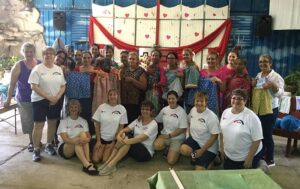
Volunteers with the Pillowcase Project traveled to Cuba to donate dresses and train locals on how to make the pillowcase dresses and shorts themselves.
Renner’s “right hand,” Kathy Diehl, and six other volunteers celebrated the project’s 10th anniversary by embarking on a mission trip of their own. In mid-February, the Princess Pillowcase Project teamed with mission organization Bridging the Nations Ministry International and traveled to Cuba to host sewing workshops and provide donations of sewing machines, 650 dresses, and 300 pairs of shorts, as well as over-the-counter-medications, toiletries and toys. They were greeted with hugs and kisses from the women and children who were grateful for the outpouring of love and support from the women who would become like family to them. Renner estimates about 22 Cuban women participated in the workshops held over two days, and each, while learning to sew, made a dress and a pair of shorts. In addition, the group visited eight rural communities and churches, delivering clothing for the local children to wear and sewing kits for the women to use to make more.
The group plans a return to Cuba in 2022, and will take up to 40 new sewing machines to donate, along with medications, toiletries and more completed dresses and shorts for children.
Diehl met Renner after retiring when she signed up for West Coast swing dance lessons. She joined the effort after noticing a posting for a sewing day on a white board in the studio in April 2011.
“It was almost like it was meant to be because I’ve been sewing all my life,” says Diehl. “Just the fact that our friends referred us to June and this just rolled around right after we started taking lessons with her. It just seemed like I was called to do it.”
Diehl sews, cuts material, makes kits and more, spending between 20-40 hours a week. It’s her answer to her husband’s golfing hobby, and she never expected to continue for nine years.
“But when you get the first photograph back from one of the missionaries of a little girl wearing your dress, it’s motivation,” she says. “You just want to keep sewing. And now that we’ve taken the trip to Cuba and actually given out the dresses and shorts ourselves, it’s even more touching. It’s just a blessing to be able to do it.”
Diehl, Renner and the others remain in touch with their Bridging the Nations guide, Orlando Valdes, and several of the women through Facebook.
Ana Marys Sánchez Pino spent a full day with the women and sewed one dress and one pair of shorts. Since, she has completed more clothing items at home for her three children. Pino complimented the project and the women through Facebook, with Valdes translating.
“I loved to see that a pillowcase can be turned into a dress,” she says. “They are wonderful ladies and I ask God to bless their lives and the beautiful work they do, not just with women but with kids also and those dresses they make.”
“They had a lot of patience teaching us, even with me, having no knowledge of sewing and with great love they taught us,” says Lisset Diaz Sanchez, also translated by Valdes, her husband, through Messenger. “These ladies have a great ministry helping children they don’t know.
“God willing, they can make another trip, teach us other things and continue their passion to help and teach other women.”
Today, just as Renner, Diehl and many others are doing during the COVID-19 crisis in the United States, Pino, Sanchez and the other Cuban participants have converted their acquired skills to making masks for hospitals, doctors’ offices, day care centers, nursing homes and fire departments. Once the pandemic is over, Renner hopes to recruit additional volunteer sewers for her project.
“We absolutely need more sewers in order to honor all the requests we get from missionaries,” she says. “I am hoping that many who are now sewing masks for protection from COVID-19 will consider making dresses and/or shorts at our workshops or at home when the current pandemic is behind us. Our kits include everything necessary to complete each article and we would be happy to get these out to anyone interested.”
Renner sums up her project. “The whole reason I do this, what has kept me going for 10 years, is that first little girl and that smile,” she says. “To see that little girl’s face, she probably never had a dress like that in her life and it was made just for her.
“It’s more than just that article of clothing. There’s somebody that really cares about you.”

